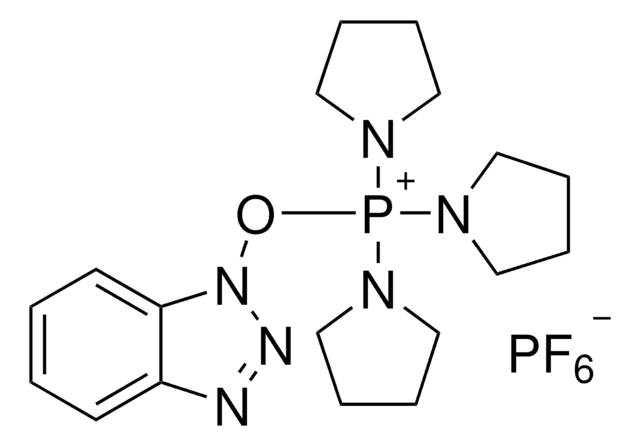12804
HBTU
≥98.0% (T), for peptide synthesis
Synonym(s):
N,N,N′,N′-Tetramethyl-O-(1H-benzotriazol-1-yl)uronium hexafluorophosphate, O-(Benzotriazol-1-yl)-N,N,N′,N′-tetramethyluronium hexafluorophosphate
About This Item
Recommended Products
Product Name
HBTU, ≥98.0% (T)
Quality Level
Assay
≥98.0% (T)
form
solid
reaction suitability
reaction type: Coupling Reactions
mp
200 °C (dec.) (lit.)
solubility
acetonitrile: 0.1 g/mL, clear
application(s)
peptide synthesis
functional group
amine
storage temp.
2-8°C
SMILES string
F[P-](F)(F)(F)(F)F.CN(C)C(\On1nnc2ccccc12)=[N+](/C)C
InChI
1S/C11H16N5O.F6P/c1-14(2)11(15(3)4)17-16-10-8-6-5-7-9(10)12-13-16;1-7(2,3,4,5)6/h5-8H,1-4H3;/q+1;-1
InChI key
UQYZFNUUOSSNKT-UHFFFAOYSA-N
Looking for similar products? Visit Product Comparison Guide
General description
Application
Signal Word
Warning
Hazard Statements
Precautionary Statements
Hazard Classifications
Skin Sens. 1A
Storage Class Code
11 - Combustible Solids
WGK
WGK 3
Flash Point(F)
Not applicable
Flash Point(C)
Not applicable
Personal Protective Equipment
Choose from one of the most recent versions:
Already Own This Product?
Find documentation for the products that you have recently purchased in the Document Library.
Customers Also Viewed
Our team of scientists has experience in all areas of research including Life Science, Material Science, Chemical Synthesis, Chromatography, Analytical and many others.
Contact Technical Service










